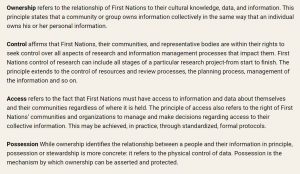The First Nations Principles of OCAP were created by the First Nations Information Governance Centre (FNIGC) and established how data belonging to First Nations will be collected, protected, used, or shared. The acronym stands for Ownership, Control, Access, and Possession.

The principles were created with the understanding that Indigenous Peoples understand their own needs and are in the best position to govern their own information. Data sovereignty is a crucial step toward Indigenous People’s self-determination.
When described on the FNIGC website, the principles are explicitly applicable to research and information governance, but I see potential to use them as a way to discuss data sovereignty in educational technology. For example, if you look at the Privacy Policy for the online engagement and brainstorming tool Padlet, they say:
“When you access or use the Service, you are deemed to consent to the collection, use, retention, transfer, structuring, manipulation, storage, transmission and/or disclosure (collectively, “processing”) of your information as described in this Policy and in accordance with applicable laws.”
So when we talk about the risks of educational technology, especially of online teaching tools or authoring applications, we must consider data sovereignty within our own principles of design. OCAP is one model that can start a discussion in this area.